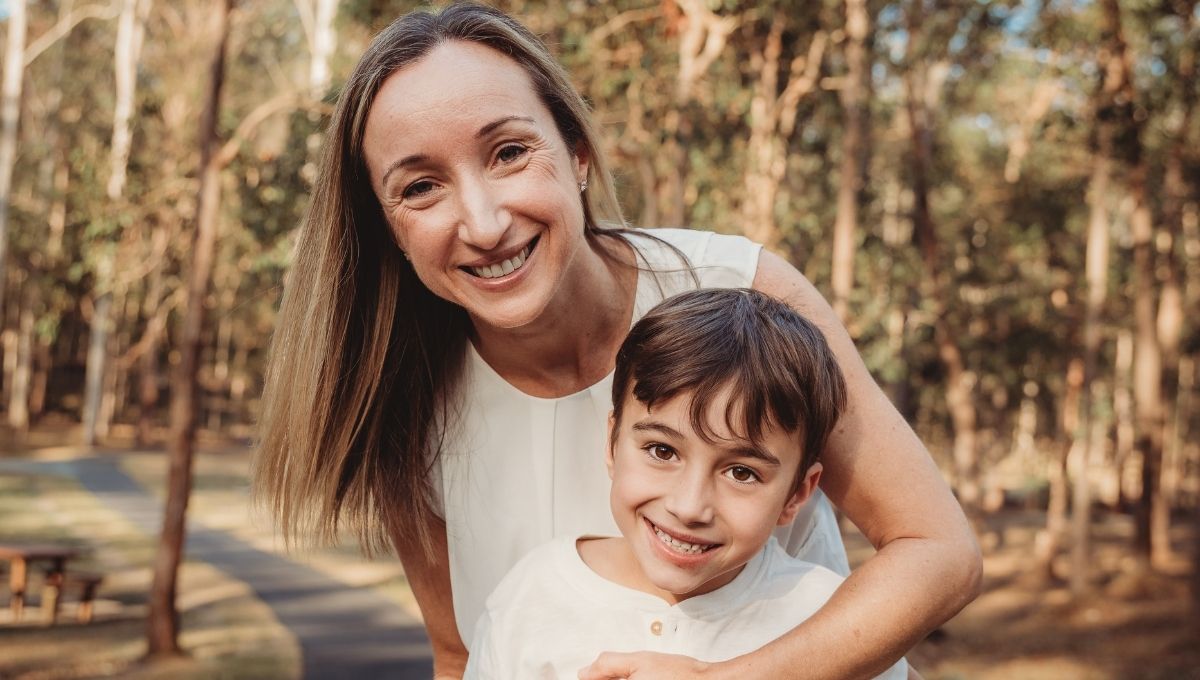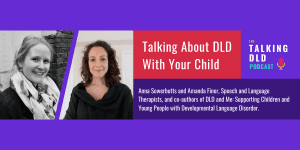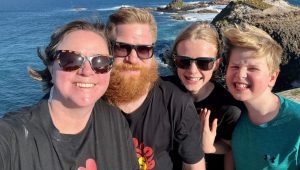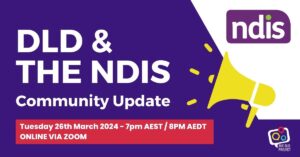1 in 14 people have Developmental Language Disorder (DLD), a hidden disability that makes talking and listening difficult. The below insights have been provided by Katrina, Jett’s mum in support of #DLDday. Thank you to the incredible Megan, from Megan Leete Photography for capturing these wonderful images of Jett and Katrina and THANK YOU to Katrina and Jett for sharing their story with us.
About Jett
Jett is a rambunctious 7-year-old boy who can’t sit still for more than 2 minutes. He has so much energy and travels through life constantly moving. He enjoys many things. The beach, AFL, soccer, Lego, trampoline, playing with his sister and playing with his mates. But he absolutely loves music. He has a mind for it. He remembers tunes and lyrics in a way like no other. Dances and grooves to it, and simply holds a passion for it that sees it a part of his daily life. He’s a very happy kid and his infectious smile makes him a cheeky well-known little character.
When did you notice SIGNS Jett was struggling with his language?
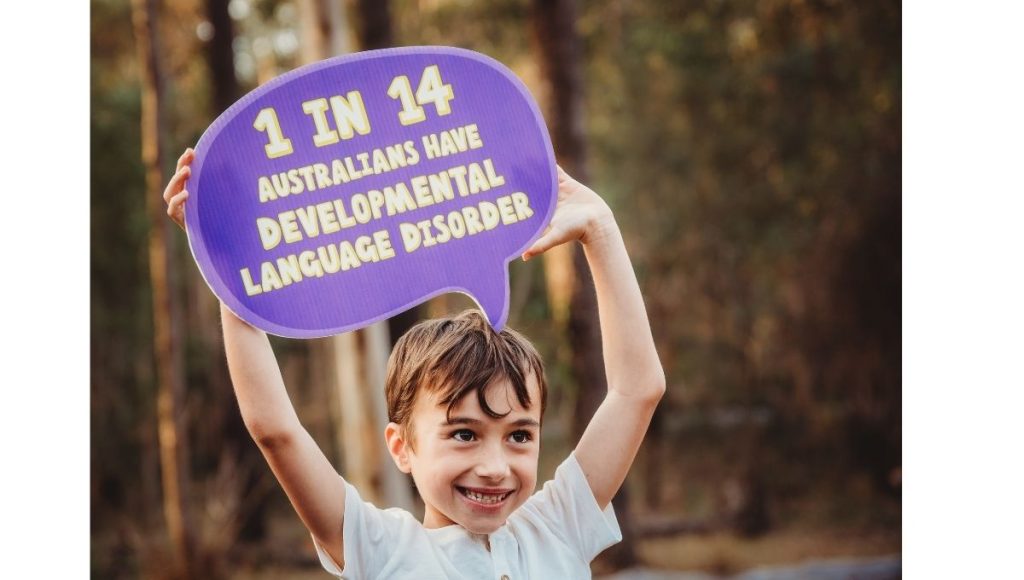
Jett has a sister who is 3 years older than him, who was well advanced with her language development. It set a high expectation in my mind for what was normal development. Between the age of 2-3 I started to wonder a little as Jett was definitely developing words slower than his sister. It was hard for me to determine if my expectations were just too high or if there really was an issue to consider. During the 12 months that Jett moved from 3 – 4 years, the delay became more obvious. I realised that Jett was generally below his peers and our basics efforts to encourage him to pick up words were not proving effective. It was at that point that I decided we needed to seek help.
What did you do when you noticed he was having challenges?
Coming up to Jett’s 4th birthday, I spoke to a family friend who was a Speech Pathologist, using her as a sounding board for my concerns. She confirmed where my mind was at and as a result I asked the GP for a referral to a Speech Pathologist at the time I took Jett for his 4 year old needles. This led to us meeting Shaun for a consultation and the rest is history.
What have been the strategies that have most helped Jett?
In day-to-day life at home a lot of our practices to support Jett have centred around repetition and simplicity, avoid cognitively overloading him and (our) patience. Some of these practices have also been flowed into his learning environment with Shaun working closely with and educating Jett’s teachers on how to support him. Their willingness to understand and participate in his development has greatly supported Jett’s ongoing development.
What support has Jett accessed from health professionals?
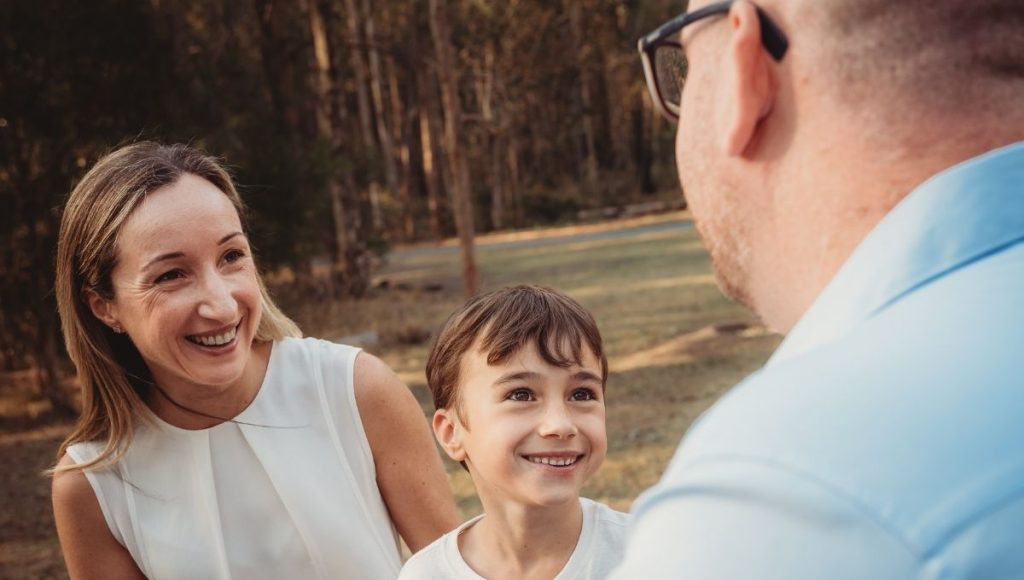
Since turning 4, Jett has regularly attended Speech Pathology sessions. For 3.5 years we attended almost every week for regular sessions with Shaun and also participated in assessments on occasion. He has also attended Occupational Therapist assessments to support these processes.
Have you applied to the NDIS? If yes, what has your experience been?
We had some success with NDIS though it was short lived. The pessimist in me never believed we would receive any support, so something was better than nothing. Jett was granted access to Early Intervention funding which essentially saw his needs as a learning difficulty and did not define his needs as an ongoing challenge throughout life. After 12 months of NDIS support, we were advised that Jett would be reviewed, noting that Early Intervention funding was cut at the time that a child turned 7 years old. We were asked to provide further proof to his needs and the potential impact it can/does have on his life. The feedback from the NDIS was that Jett’s needs were not lifelong and therefore ongoing support wasn’t needed outside of what a person can normally access in the standard Medicare system. We attempted to appeal the decision but were unsuccessful.
So, funding for us has now ended. I was appreciative for what we received but I am disappointed by NDIS’s interpretation of DLD. I felt that because my child did not display a physically disability, that meant they were not a child with needs. Overall, I found the experience of dealing with the NDIS incredibly frustrating. The case managers did not know their stuff, they contradicted themselves (or each other) in conversations with me and were regularly unable to really answer my questions. Their system was clunky, they failed to meet their own communication deadlines and multiple times failed to send me documents promised. As a mother seeking the best she can achieve for her child, I found it emotional at times and really disappointing. I found the NDIS system to be dysfunctional and ineffective in what it is supposed to achieve. I truly feel for any family in Australia who must navigate the NDIS processes.
How has Jett found navigating school? Do his educators know and understand what DLD is?
We have been very privileged to be supported by wonderful Educators both during Jett’s kindy and school years. With every new year, there is a new conversation to define DLD and discuss the potential support requirements. And while these requirements now feel a little less demanding than our first couple of years, they still require dedication and genuine support from the teachers. As Jett’s Speech Pathologist, Shaun connects with the school in the first term of every year. He liaises with the Educators to define and discuss the needs, assist with understanding of DLD and support where needed with tips on how to tweak learning processes.
We generally back this up with a school visit from Shaun a little further into the year to see how Jett is going, along with our supporting OT. Jett definitely has to try harder than some other kids. But he takes great pride in being able to make his teachers proud of him and puts a lot of effort in. So, while there’s some hard work, we haven’t struggled with Jett’s willingness to attend and participate at school.
How has Jett found making and maintaining relationships?
Jett is a very happy and social kids and thankfully regardless of speech delays when he was younger in daycare/kindy, he has always made friends easily. Impacts to relationships was more at home especially when he was little and didn’t have the vocabulary to describe his feelings. He would become frustrated and upset without those verbal cues to explain himself. That has understandably improved over the years though I still find there are times where his story telling can be a little difficult for him and we must ask questions to really understand. But it is getting better with every year.
What are the areas he struggles with that you believe are due to DLD?
The biggest part for me has been his ability to regulate his own emotions when he didn’t have a way to explain himself. He has had a lot of supportive people around to help him navigate this struggle, so he could learn to develop the language and better describe what he felt. This has been an all-team approach with parents, sister, Shaun and educators a part of the process.
What do you want people to know about DLD?
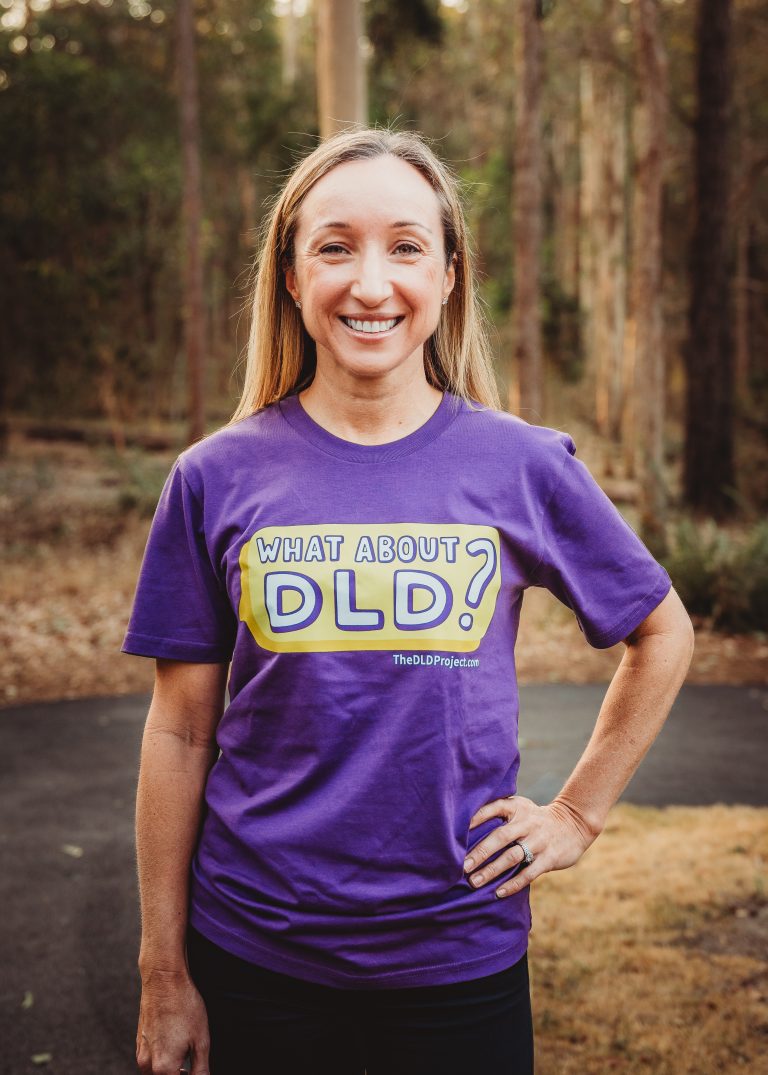
DLD is not a disability but an opportunity. It is a chance to help great people shine who just needed support in getting there. Be open minded and supportive. This is not a learning difficulty that will disappear next week, next month or next year. DLD folk will be managing this for the rest of their lives. So, take the time to understand DLD better and learn how you can support them.
What will you be doing on #DLDday 2023?
I will be proudly wearing my “What about DLD?” t-shirt and watching our Brisbane landmarks light up purple for our DLD kids. These kids deserve all the airtime they can get. They have so much potential to achieve in life if they can just get the right support. Let’s keep beating that drum.
JOIN THE WHAT ABOUT DLD CAMPAIGN?!

1 in 14 Australians have a hidden disability called Developmental Language Disorder (DLD) and they feel invisible. Please choose at least one of the following ways to join the ‘What about DLD?’ national campaign in 2023.
FIND A SPEECH PATHOLOGIST NEAR YOU
If you don’t have a speech pathologist at your school, try Speech Pathology Australia’s Find a Speech Pathologist page or Google ‘speech pathology services near me’. You can self-refer to many speech pathology services, but you may also like to speak to your GP who may be able to help you access a Chronic Disease Management plan through Medicare. Write down your concerns about your child’s language, literacy and learning to share with the speech pathologist.
Access our free DLD training resources for families
Head to our DLD training for families page to access courses and information on understanding a DLD diagnosis, navigating the NDIS and What is Language + What is DLD?

